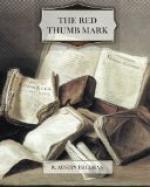“Samuel Seppings!”
A stolid-looking working-man rose and, taking the Testament in his hand, stood regarding the usher while that official sang out in a solemn monotone—
“You shall well and truly try and true deliverance make between our Sovereign Lord the King and the prisoner at the bar, whom you shall have in charge, and a true verdict give according to the evidence. So help you God!”
“James Piper!” Another juryman rose and was given the Book to hold; and again the monotonous sing-song arose—
“You shall well and truly try and true deliverance make, etc.”
“I shall scream aloud if that horrible chant goes on much longer,” Juliet whispered. “Why don’t they all swear at once and have done with it?”
“That would not meet the requirements,” I answered. “However, there are only two more, so you must have patience.”
“And you will have patience with me, too, won’t you? I am horribly frightened. It is all so solemn and dreadful.”
“You must try to keep up your courage until Dr. Thorndyke has given his evidence,” I said. “Remember that, until he has spoken, everything is against Reuben; so be prepared.”
“I will try,” she answered meekly; “but I can’t help being terrified.”
The last of the jurymen was at length sworn, and when the clerk had once more called out the names one by one, the usher counting loudly as each man answered to his name, the latter officer turned to the Court and spectators, and proclaimed in solemn tones—
“If anyone can inform my Lords the King’s justices, the King’s attorney-general, or the King’s serjeant, ere this inquest be now taken between our Sovereign Lord the King and the prisoner at the bar, of any treason, murder, felony or misdemeanour, committed or done by him, let him come forth and he shall be heard; for the prisoner stands at the bar upon his deliverance.”
This proclamation was followed by a profound silence, and after a brief interval the Clerk of Arraigns turned towards the jury and addressed them collectively—
“Gentlemen of the jury, the prisoner at the bar stands indicted by the name of Reuben Hornby, for that he, on the ninth or tenth of March, feloniously did steal, take and carry away a parcel of diamonds of the goods of John Hornby. To this indictment he has pleaded that he is not guilty, and your charge is to inquire whether he be guilty or not and to hearken to the evidence.”
When he had finished his address the clerk sat down, and the judge, a thin-faced, hollow-eyed elderly man, with bushy grey eyebrows and a very large nose, looked attentively at Reuben for some moments over the tops of his gold-rimmed pince-nez. Then he turned towards the counsel nearest the bench and bowed slightly.
The barrister bowed in return and rose, and for the first time I obtained a complete view of Sir Hector Trumpler, K.C., the counsel for the prosecution. His appearance was not prepossessing nor—though he was a large man and somewhat florid as to his countenance—particularly striking, except for a general air of untidiness. His gown was slipping off one shoulder, his wig was perceptibly awry, and his pince-nez threatened every moment to drop from his nose.




